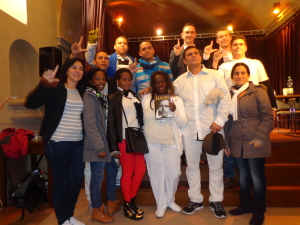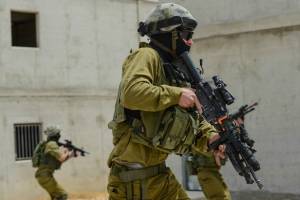| |
On Dec. 17, 2014, President Barack Obama announced a dramatic change in the United States’ policy toward Cuba, heralding the end of a Cold War-era conflict that had begun to look increasingly anachronistic. The benefits of the two longtime foes’ new and improved relationship remain to be seen — but the contradictions involved are already obvious. Over half a century of pursuing an aggressive anti-American foreign policy, Cuba has made plenty of friends whom the United States considers enemies, and Havana is unlikely to easily let go of its longtime allies. These include Russia, Venezuela, and a variety of Arab dictators, Islamic fundamentalist movements, and anti-Israeli terrorist organizations. The list of Cuba’s unsavory friends also includes Iran — a relationship of particular salience on the world stage today.
Communist Cuba’s alliance with the Iran of the Ayatollahs dates to 1979, when Fidel Castro became one of the first heads of state to recognize the Islamic Republic’s radical clerics. Addressing then-Supreme Leader Ayatollah Khomeini, Castro insisted that there was “no contradiction between revolution and religion,” an ecumenical principle that has guided Cuba’s relations with Iran and other Islamic regimes. Over the next two decades, Castro fostered a unique relationship between secular communist Cuba and theocratic Iran, united by a common hatred of the United States and the liberal, democratic West — and by substantial material interests. (In the photo, Iran’s Vice President Mohammad Reza Rahimi and Cuba’s Vice Foreign Minister Marcos Rodriguez attend a wreath-laying ceremony on Revolution Square in Havana on Sept. 7, 2011.)
In the early 1990s, Havana started to export biopharmaceutical products for the Iranian health care system and trained Iranian scientists to use them. By the end of the decade, it had moved beyond simple exports to transferring medical biotechnology and, along with the technical know-how, capabilities for developing and manufacturing industrial quantities of biological weapons. In addition to training Iranian scientists in Cuba and sending Cuban scientists and technicians to Iran’s research centers, the state-run Center for Biotechnology and Genetic Engineering established a joint-venture biotechnology production plant near Tehran at a cost of $60 million, with Cuba providing the intellectual capital and technology, and Iran providing the financing. This facility, now under Iranian control, is believed to be “the most modern biotechnology and genetic engineering facility of its type in the Middle East.”
Iran has also benefited from its friendship with Havana in more aggressive ways. Geographically, Cuba’s strategic location enabled the Islamic Republic, on at least one occasion, to clandestinely engage in electronic attacks against U.S. telecommunications that posed a threat to the Islamic regime’s censorship apparatus. In the summer of 2003, Tehran blocked signals from a U.S. satellite that was broadcasting uncensored Farsi-language news into the country at a time of rising unrest. Based on the satellite’s location over the Atlantic, it would have been impossible for Iranian-based transmissions to affect its signals. Ultimately, the jamming was traced to a compound in the outskirts of Havana that had been equipped with the advanced telecommunications technology capable of disrupting the Los Angeles-based broadcaster’s programming across the Atlantic. It is well known that Cuba has continuously upgraded its ability to block U.S. broadcasts to the island, and hence, conceivably, to jam international communications. Although the Cuban government would later claim that Iranian diplomatic staff had operated out of the compound without its consent, given that Cuba “[is] a fully police state,” as Iran expert Safa Haeri has noted, “it is difficult to believe the Iranians had introduced the sophisticated jamming equipment into Cuba without the knowledge of the Cuban authorities,” much less utilized it against U.S. targets without the knowledge of the Castro regime.
In return for its services, Iran has compensated the Cuban government directly. During the presidency of Mohammad Khatami (1997-2005), Tehran offered Havana an initial 20 million euro annual credit line. Following the election of Mahmoud Ahmadinejad in 2005, Iran expanded this credit line to 200 million euros for bilateral trade and investment projects. At the same time, Havana was spearheading a campaign within the Non-Aligned Movement to legitimize Iran’s “peaceful” nuclear program as an “inalienable right” of all developing nations. In June 2008 Ahmadinejad approved a record 500 million euro credit for the Castro regime. From Iran’s perspective, Cuba deserves to be rewarded for its “similarity in outlooks on international issues.”
In total, Cuba has received the equivalent of over one billion euros in loans from Tehran since 2005. With this financing, Cuba has begun to make critical investments in the rehabilitation of dilapidated Soviet-era infrastructure. Iran is funding some 60 projects ranging from the acquisition of 750 Iranian-made rail cars to the construction of power plants, dams, and highways. This infusion of Islamic capital has strengthened the Cuban regime’s stability and reduced the risk of economic collapse by adding a fourth financial pillar alongside oil from Venezuela, bilateral trade credits from China and Russia, and corporate capital from Canada, Latin America and the European Union.
The election of the apparently more moderate Hassan Rouhani, the reduction in the price of oil, and Iran’s involvement in the Middle East have precluded additional credits to Cuba. Yet the relationship, as evidenced by visits, cooperation in international organizations, and joint support for Venezuela, has continued.
Tehran’s and Havana’s shared interest in Venezuela is another source of potential concern to the West. Venezuela’s strategic position and considerable resources make it a potentially greater threat to U.S. interests in the region than the one posed in the 1960s by the Castro regime. Venezuela’s alliances with Iran, Syria, and other anti-American countries and its support for terrorist groups, while representing a smaller threat, are as formidable a challenge as the Cuba-Soviet alliance. And while Cuban support for the regime in Caracas is fairly well known, Iran, too, has been offering Venezuela technical assistance in the areas of defense, intelligence, energy, and security. Iranian as well as Cuban personnel are advising, protecting, and training Venezuela’s security apparatus.
Of more strategic significance is the possibility that Iranian scientists are enriching uranium in Venezuela for shipment to Iran. Venezuelan sources have confirmed this possibility. Foreign intelligence services consulted by the author acknowledged these rumors but are unable to confirm them. If confirmed, these actions would violate U.N. sanctions as well as U.S. security measures.
If the United States really intends to expand its relations with Cuba, Washington needs to address Havana’s troublesome alliances with rogue regimes — above all, its friendship with Tehran. These alliances — as well as the desire of the Cuban military to remain in power and transfer control to younger, but still conservative, anti-American leaders — are a troubling sign that internal liberalization will be slow and difficult. No matter how much Washington may want to see a new and friendlier Cuba, the island nation’s choice of allies says more about the future of this relationship than any number of well-meaning declarations.
_________________________________________________
*Jaime Suchlicki is Emilio Bacardi Moreau Distinguished Professor and Director, Institute for Cuban and Cuban-American Studies, University of Miami. He is the author of Cuba: From Columbus to Castro, now in its fifth edition; Mexico: From Montezuma to the Rise of PAN, now in its second edition and the recently published Breve Historia de Cuba.
_________________________________________________
**Previously published in Foreign Policy on March 27, 2015. The article is based on a presentation about Iran and Cuba at a seminar organized by the Center for Hemispheric Policy, University of Miami, January 6, 2015.
_________________________________________________
|


 By Andres Oppenheimer
By Andres Oppenheimer ion coalition, known by its acronym MUD, said before the 2013 elections that while the number of Venezuelans aged 18 and over had grown by 4.3 percent durin the previous three years, the number of registered voters had risen by 7.3 percent. But MUD had found the overall voting registry “acceptable,” the Carter Center Report said.
ion coalition, known by its acronym MUD, said before the 2013 elections that while the number of Venezuelans aged 18 and over had grown by 4.3 percent durin the previous three years, the number of registered voters had risen by 7.3 percent. But MUD had found the overall voting registry “acceptable,” the Carter Center Report said.








